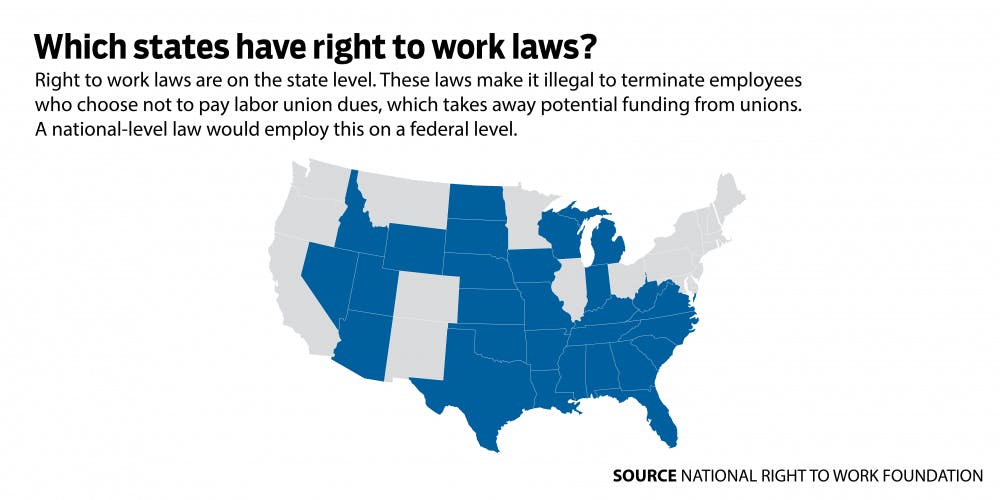Rep. Trey Hollingsworth, R-9th District, announced his support Friday for legislation that would make it illegal under federal law for companies to fire their employees for not paying labor union dues.
The National Right to Work Act is similar to a state-level law in Indiana, but national legislation could standardize it across the board and remove currently existing protections for some labor union groups.
“Hoosiers are the best decision makers when it comes to how their hard-earned dollars are spent,” Hollingsworth said in a press release. “They should have the power to decide whether or not to pay union dues without fear of losing their job.”
Right-to-work laws are typically supported by Republicans and business executives. Opponents are those who engage in labor unions, as well as Democrats who favor regulations that directly or indirectly strip power from corporations.
According to Hollingsworth’s release, the Bureau of Labor Statistics and the Department of Commerce reported private-sector job growth in right-to-work states is 4 percent higher than that in non-right-to-work states. Right-to-work states also place $2,600 more in the pockets of workers each year.
“This bill isn’t just about empowering Americans to decide if union membership is right for them. It is about enhancing freedoms for all Americans,” Hollingsworth said in the release.
Organizations supporting the bill, including the National Right to Work Legal Defense Foundation, say they focus on individual freedom rather than taking a side on whether labor unions are beneficial to society.
These groups argue unions have the ability to represent all workers legally, depriving workers who don't want that of their rights and individuality. They’re doing this while siphoning money from workers' paychecks by force.
But many belong to the other side — unions represent workers regardless of whether they pay dues. Taking away mandatory fees could potentially harm the unions' cause and the strength of their fight.
“We’re one of the last groups that has political power,” Brian Farkas said. “We have a voice, and they want to take away that voice from us and from the working class.”
Farkas is chairman of the Indiana State Legislative Board and a vice president of the Indiana State American Federation of Labor and Congress of Industrial Organizations. He has been a member of the Brotherhood of Locomotive Engineers and Trainmen since 1997.
He said the state-level legislation doesn’t affect the railroad industries due to the federal-level Railway Labor Act, which allows the railroad industry to disregard right-to-work laws. But if the National Right to Work Act were to pass, the exemption would be taken away.
“The railroad industry releases statements that they oppose these anti-union laws, but at the same time they spend about $26 million a year lobbying Congress for their interests, while we’re only spending about $600,000,” Farkas said.
Farkas said labor unions are often misunderstood as nefarious organizations, but groups like his go through a fairly democratic process with bargains, elections and negotiations. He said they exist to fight against laws and actions that threaten the working class.
Historically, certain labor unions have been associated with organized crime and mafia involvement, and many don’t trust the groups due to a long-existing stigma and over-exaggeration in American news media. This leads to a lot of skepticism of their true intent.
“When you think about labor protection, there is a misconception about what labor unions try to do and protect,” Farkas said. “Unions do a lot of work to have a regulatory safe workplace and to make sure our safety as workers is protected.”
IU labor studies associate professor Lynn Duggan said the bottom line is the United States has poor labor laws, especially compared to nations in Western Europe. She said it is important to fight against the National Right to Work Act because of the "free rider" problem.
Unions are required to represent all workers in a bargaining unit, including those who don't want to pay for representation, or free riders. Combined with an already declining union membership and weak U.S. labor laws, Duggan said the future of unions as a whole and worker conditions are in limbo.
“Manufacturing employment has declined,” Duggan said. “As the number of workers has declined, so has labor union membership. Also, unions didn’t do a good job supporting and representing women and minorities.”
Duggan said in countries like Germany, labor rights and courts are stronger and cases involving labor disputes are heard in a timely manner. If the U.S. had similar procedures, Duggan said, the public wouldn’t need to worry as much about right-to-work laws.
“Unions can also bargain on behalf of entire industries and not just the individual company,” Duggan said. “If everyone were covered, that support leads to more union members.”
But regardless, Duggan said the passage of the National Right to Work Act would only perpetuate a race to the bottom for the United States. The legislation will take away some of the already-declining leverage on which the unions rely to fight for the working class.
“Do we want to pursue lower wages in our country to keep jobs here, or do we want to protect workers?” Duggan said.




